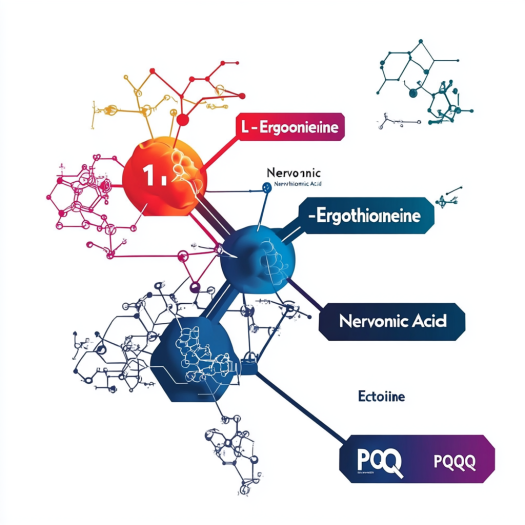
Nervonic acid might not be a household name, but its benefits are groundbreaking for health and wellness, especially for brain health and nerve regeneration.
Nervonic acid is primarily used to support brain health, nerve regeneration, and cognitive performance. It is a bioactive fatty acid found in dietary supplements, functional foods, and cosmetics. This unique compound enhances nerve cell repair and myelin synthesis, making it vital for those targeting neurological wellness.
Curious about how it can transform health outcomes? Let’s dive deeper into the world of nervonic acid.
How does nervonic acid improve brain health?
Nervonic acid plays a key role in enhancing brain function and nerve cell repair.
Nervonic acid supports myelin synthesis, the protective sheath of nerve cells, which improves cognitive performance and brain health. It is essential for repairing and maintaining the myelin sheath, crucial for efficient neural communication.

Diving deeper: The science behind nervonic acid’s impact
Myelin acts like insulation for nerve fibers, allowing faster and more efficient communication between brain cells. Without sufficient myelin, signals can get distorted, leading to cognitive decline or neurological disorders. Nervonic acid, naturally present in rapeseed oil and other sources, becomes a building block for myelin biosynthesis.
This has profound implications:
- Cognitive Health: Nervonic acid supplementation has been linked to improved focus, memory, and learning capabilities.
- Neurological Disorders: Research suggests it may help manage conditions like multiple sclerosis or peripheral neuropathy by boosting nerve repair.
- Brain Development: In infants and children, nervonic acid contributes to neural growth and development, supporting overall cognitive milestones.
| Benefits of Nervonic Acid | Applications |
|---|---|
| Enhances myelin production | Brain health supplements |
| Improves cognitive function | Functional foods |
| Aids nerve regeneration | Pharmaceuticals |
Santa Biotech’s nervonic acid is derived sustainably, with high purity, ensuring maximum bioavailability. Explore nervonic acid applications on our website.
Can nervonic acid aid in nerve regeneration?
Absolutely, nervonic acid is a cornerstone in nerve repair therapies.
Nervonic acid accelerates the repair of damaged nerves by supporting their cellular structure and myelin regeneration. This makes it vital in therapies for neurological conditions.
Diving deeper: How nervonic acid repairs nerves
Nerve injuries can disrupt daily life. Whether caused by chronic illness or trauma, recovery often depends on the body’s ability to rebuild nerve cells. Nervonic acid works by providing essential lipids to regenerate myelin, the nerve’s protective cover, and improve cellular signaling.
- Peripheral Nerve Repair: Ideal for conditions like diabetic neuropathy or trauma-related nerve damage.
- Chronic Neurological Disorders: Its role in myelin repair offers hope for diseases like multiple sclerosis, which erode nerve functionality.
- Neuroprotection: As an antioxidant, nervonic acid mitigates oxidative stress, a common contributor to nerve damage.
This unique capability to repair and regenerate has made nervonic acid a staple in advanced medical therapies.

Is nervonic acid beneficial for cognitive decline prevention?
Yes, it plays a preventive role in age-related cognitive issues.
Nervonic acid improves memory retention, focus, and overall cognitive resilience by maintaining healthy neural pathways. It’s an emerging solution for combating Alzheimer’s and other degenerative diseases.
Diving deeper: Nervonic acid as a cognitive protector
Aging affects everyone, but it’s the brain that often shows the earliest signs. Declining memory, slower processing, and difficulty concentrating are common. Nervonic acid combats these effects by:
- Boosting Synaptic Efficiency: By keeping neural pathways intact, nervonic acid improves communication between brain cells.
- Reducing Inflammation: Chronic inflammation is a leading cause of cognitive decline, and nervonic acid’s anti-inflammatory properties help counteract this.
- Preventing Neural Degeneration: It slows the breakdown of myelin and nerve cells, prolonging brain health.
| Age Group | Benefits of Nervonic Acid |
|---|---|
| Young Adults | Supports focus and mental clarity |
| Middle-aged | Protects against early cognitive decline |
| Elderly | Reduces risks of Alzheimer’s and dementia |
For more about its benefits, visit Santa Biotech’s nervonic acid product page.
Can nervonic acid be used in skincare?
Surprisingly, yes! Nervonic acid’s benefits extend to cosmetic applications.
Nervonic acid hydrates and strengthens the skin barrier, making it a valuable ingredient in anti-aging and sensitive skincare products. It promotes cell membrane repair, enhancing skin resilience.
Diving deeper: Skincare applications of nervonic acid
The same properties that help nerves thrive make nervonic acid a powerhouse in skincare. Skin, like nerve cells, relies on lipids to maintain its structure and hydration. Nervonic acid steps in to repair damaged skin barriers, replenish moisture, and combat the effects of aging.
Key benefits include:
- Barrier Repair: Helps in conditions like eczema by strengthening skin’s natural defenses.
- Deep Hydration: Its lipid-rich profile ensures long-lasting moisture retention.
- Anti-Aging Effects: Reduces fine lines and wrinkles by promoting cellular repair.
Skincare manufacturers increasingly use nervonic acid in creams and serums tailored for sensitive or aging skin.
Conclusion
Nervonic acid is more than a nutrient; it’s a lifeline for brain health, nerve repair, cognitive function, and even skincare. Its diverse applications make it a must-have ingredient for health and wellness industries.

